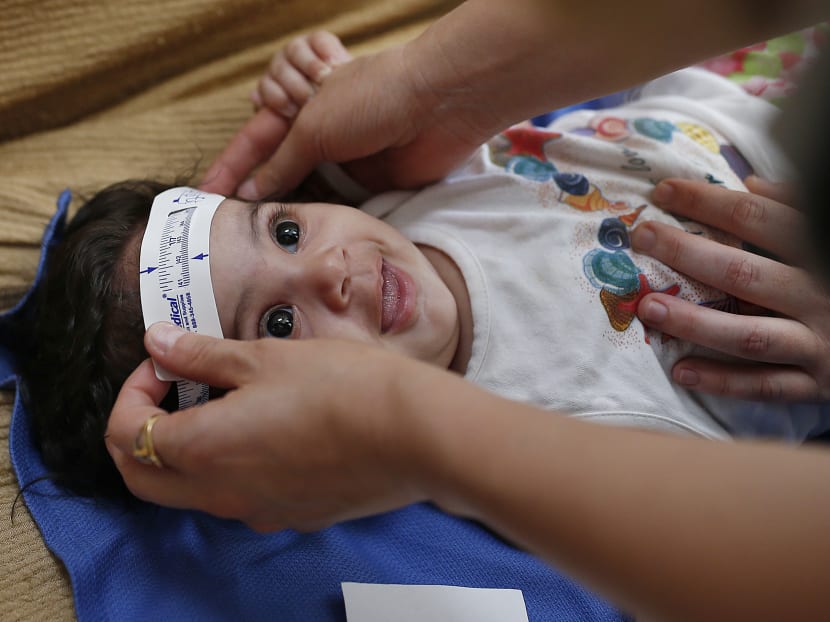Pregnant women with Zika have up to 13% risk of microcephaly: Study
WASHINGTON — Pregnant women infected with the Zika virus during the first trimester have a risk of up to 13 per cent that their infant will be born with the microcephaly birth defect, a new study says.

Three-month-old Esther Kamilly has her head measured by Brazilian and U.S. health workers from the United States' Centers for Disease Control and Prevention (CDC) at her home in Joao Pessoa, Brazil, Wednesday, Feb. 24, 2016, as part of a study to determine if the Zika virus is causing babies to be born with a birth defect affecting the brain. Photo: AP
WASHINGTON — Pregnant women infected with the Zika virus during the first trimester have a risk of up to 13 per cent that their infant will be born with the microcephaly birth defect, a new study says.
Scientists calculated the risk based on Zika infection data and cases of infants born with abnormally small heads and brains in French Polynesia, which experienced an outbreak in 2013-2014, and the hard-hit Brazilian state of Bahia.
Brazil has experienced an explosion of Zika infections and cases of microcephaly since 2015.
The study, which appeared on Wednesday (May 25) in the New England Journal of Medicine, said the risk of microcephaly was very low for pregnant women who contracted the disease beyond the first trimester.
Researchers from the US Centers for Disease Control and Prevention and Harvard University wrote that they found “a strong association between the risk of microcephaly and infection risk in the first trimester” of pregnancy, but “a negligible association in the second and third trimesters”.
Experts agree that the mosquito-borne Zika virus is behind a surge in cases of microcephaly after their mothers were infected with the virus.
“Although much remains unknown about the effects of (Zika) infection during pregnancy, population-level data from French Polynesia and Bahia reveal a clear association between first-trimester (Zika) infection and microcephaly risk,” the experts wrote.
They said “the estimated risk due to infection in the first trimester ranged from 0.88 per cent... to 13.2 pecent.”
If the risk of infection “is similar in the other geographic areas where (Zika) has since spread, many more cases of microcephaly and other adverse outcomes are likely to occur.”
The researchers urged pregnant women to take precautions to avoid Zika infections, “and for health care systems to prepare for an increased burden of adverse pregnancy outcomes in the coming years.”
Normally, microcephaly is rare in the United States, affecting only between 0.02 and 0.12 per cent of all births in the United States.
In Brazil, 1,271 babies have been born with unusually small heads and deformed brains since the outbreak of Zika began there last year.
The virus, which usually triggers only mild, flu-like symptoms but can also cause the rare but serious neurological disorder Guillain-Barre Syndrome, is mainly spread by two species of Aedes mosquito but has also been shown to transmit through sexual contact.
There is no vaccine to prevent Zika. AFP





